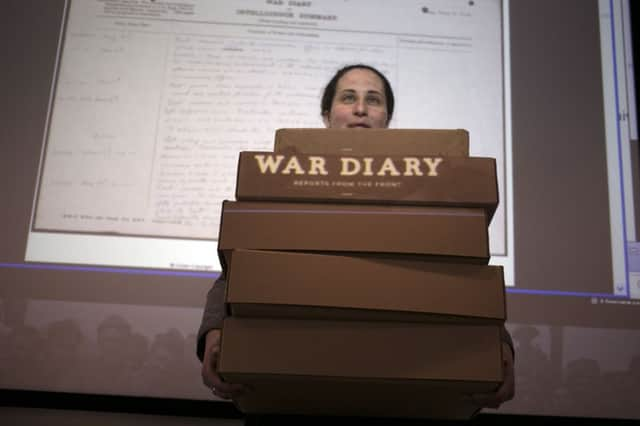Scotland has a goldmine of digital information


AT FIRST glance the poignant First World War diaries, released last week by The National Archives (London) to mark the centenary of the start of the First World War, have nothing in common with the enormous datasets held by government and business.
But the 300,000 pages detailing the experiences of men fighting and dying on the fields of France and Flanders, and the big data used to detect tax fraud, or map the human genome are examples of how records are an important national asset.
Advertisement
Hide AdAdvertisement
Hide AdWhether it is digitising hundreds of boxes of diaries, as 25 volunteers did with the First World War material, or supermarkets capturing our spending habits through reward cards, how we store, access and use these growing digital archives is an enormous challenge.
Scotland has one of the richest archive collections in the world. Our business archives, stretching back to the 17th century, contain invaluable records of how our economy has ebbed and flowed over the years, while registers of everyday Scots’ births, marriages and deaths are now worth £100 million a year in ancestral tourism. Cultural records, from David Livingstone’s hand-written chronicles of his explorations to the original rules of golf, tell the story of who we are as Scots, and our place in the world.
Most of us are now the keeper of our own digital archives; we live much of our lives online, from shopping for groceries to managing our money. We don’t expect any glitches, and when they do happen, as they invariably will, we are outraged and perhaps a bit scared by our growing dependence on digital records.
We are secure in the knowledge that our bank, supermarket or council will quickly fix the problem – and we expect the social networks we use daily to be upgraded regularly, at no cost to us, except perhaps by sharing a bit more of our private lives with Amazon or Tesco.
But whose job is it to secure the digital continuity and manage the access to our national data, the historical records and contemporary data that inform our past, and will shape our future? The Scottish Government’s digital strategy published in 2011, points out that while most data is “transactional and short-lived”, most public business in now carried out online.
To protect this fragile data, the government suggests the need for a partnership across the public sector and business, an approach the Scottish Council on Archives wholeheartedly supports.
Scotland has made significant progress in becoming a true digital economy.
The National Records of Scotland has created an internationally-recognised digital data archive, incorporating the Register of Sasines (property transactions). The National Library for Scotland has a trusted digital repository for its publications collection.
Advertisement
Hide AdAdvertisement
Hide AdA collaboration between the Scottish and UK governments, local councils and BT will ensure 85 per cent of Scottish properties will have access to fibreoptic broadband by the end of 2015 and around 95 per cent by the end of 2017 and Scotland’s public libraries have internet services allowing most Scots to participate in this new economy, carrying job advertisements and offering discounts to those who buy online.
Local archives and civil registration (births, deaths and marriages) are co-operating to provide joined-up services in family history centres, and more information is becoming available online.
And participative democracy is flourishing thanks to social media and freedom of information, which, as Rosemary Agnew, the Information Commissioner will confirm, is dependent on the good management and easy access of digital records.
Perhaps the biggest challenge now facing us in securing our digital future is ensuring we have the relevant skills in place now, and in the years to come.
There are currently 73,000 people working in the ICT sector, and there could be thousands more.
We welcome the Scottish Government’s commitment to a Skills Investment Plan to support Scotland’s transformation into a world-leading digital economy.
It is our hope that the public and private sector can work together to secure the range of skills required to maintain digital continuity.
We need investment not just in IT skills, but in archival and administrative skills too. We need to develop a strong cohort of people who can gather, organise and store the digital data that is so important to our cultural, economic and social well-being. They will maintain data standards and quality control, allowing access for decades to come.
Advertisement
Hide AdAdvertisement
Hide AdI doubt if the local registrars who painstakingly wrote out our ancestors’ birth certificates in beautiful copperplate handwriting had any idea that one day their handiwork would be worth millions of pounds to the Scottish economy.
The digital data we are starting to take for granted could be worth billions more, but we need to look after it with the same care the public servants of old lavished on their paper records.
• Dr Irene O’Brien is chairwoman of the Scottish Council on Archives www.scottisharchives.org.ukJoin Dr O’Brien and other expert speakers at Scotland’s Digital Fabric, Wednesday 29 January at The Scottish National Galleries www.scotsmanconferences.com
SEE ALSO